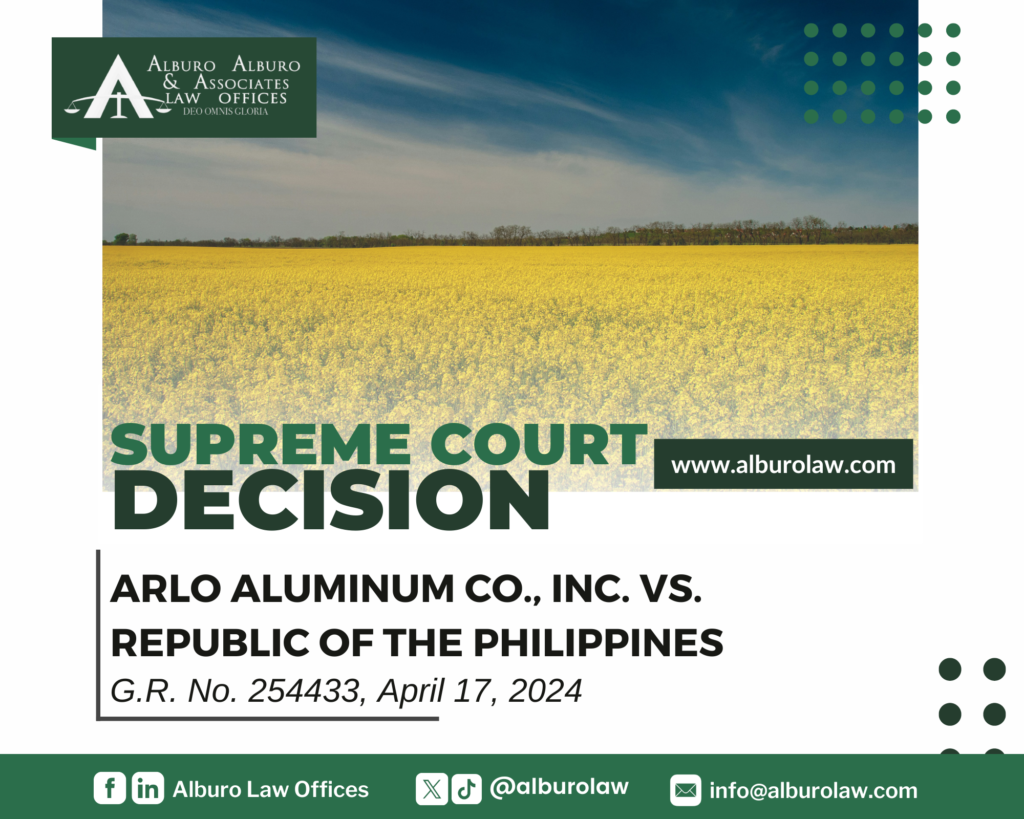The case of Arlo Aluminum Co., Inc. vs. Republic of the Philippines (G.R. No. 254433, April 17, 2024)

Photo from Unsplash | Denes Kozma
The following post does not create a lawyer-client relationship between Alburo Alburo and Associates Law Offices (or any of its lawyers) and the reader. It is still best for you to engage the services of a lawyer or you may directly contact and consult Alburo Alburo and Associates Law Offices to address your specific legal concerns, if there is any.
Also, the matters contained in the following were written in accordance with the law, rules, and jurisprudence prevailing at the time of writing and posting, and do not include any future developments on the subject matter under discussion.
AT A GLANCE:
In light of recent legal and jurisprudential developments during the proceedings of this case, the Court has decided to send the matter back to the appellate court for the admission of new evidence.
Arlo Aluminum Co., Inc. applied for registration of title over Lot Nos. 7948 and 7947 in Barangay Caniogan, Pasig City. The Republic of the Philippines, represented by the Office of the Solicitor General (OSG), opposed the application.
Following the opposition of the Republic, the following are the contentions of Arlo: (1) that the lots are alienable and disposable lands of the public domain, and (2) its possession and occupation of the lots. Arlo asserts compliance with Section 14(1) of Presidential Decree No. 1529, citing survey plans and certifications from the Department of Environment and Natural Resources (DENR) indicating the alienable and disposable status of the lots. Referring to Spouses Tan v. Republic of the Philippines, Arlo argues that DENR-CENRO certifications, unopposed or unrefuted, suffice to establish the property’s nature.
Furthermore, Arlo maintains that possession by its predecessors-in-interest was supported by testimonial and documentary evidence.
The Supreme Court in this case resolved the issue of whether Arlo sufficiently proved that it is entitled to a decree of registration over the subject lots.
And in light of recent legal and jurisprudential developments during the proceedings of this case, the Court has decided to send the matter back to the appellate court for the admission of new evidence.
Presidential Decree No. 1529, also known as the Property Registration Decree, governs who may apply for registration of title to land. Applicants falling under Section 14(1) must establish two main points: first, that the land in question is alienable and disposable public domain land, and second, that the applicant and their predecessors-in-interest have maintained open, continuous, exclusive, and notorious possession and occupation of the land under a bona fide claim of ownership since June 12, 1945, or earlier.
Significantly, Republic Act No. 11573 came into effect on September 1, 2021, amending specific provisions of Presidential Decree No. 1529 and Commonwealth Act No. 141. According to the amended provision, an applicant seeking original registration of land title must now prove the following: that the land, not exceeding 12 hectares, forms part of alienable and disposable public domain lands; that the applicant or their predecessors-in-interest have possessed the land openly, continuously, exclusively, and notoriously under a bona fide claim of ownership for at least 20 years prior to the application filing date.
For emphasis: the time period during which the applicant must have possessed the subject land under a bona fide claim of ownership has been changed from “since June 12, 1945 or earlier” to 20 years immediately before the filing of the application for confirmation of title.
Moreover, Section 7 of Republic Act No. 11573 outlines the necessary evidence to establish the land’s alienable and disposable nature. A certified statement from a designated geodetic engineer from the Department of Environment and Natural Resources (DENR) suffices. This certification must affirm that the land is classified as alienable and disposable agricultural land of the public domain, specifying the relevant issuance and Land Classification Project Map Number. Importantly, the approval of the DENR Secretary for land classification or an original classification document is no longer required.
Given that Arlo’s application was still pending as of September 1, 2021, the retroactive application of the guidelines in Pasig Rizal is mandated. Consequently, the case must be returned to the Court of Appeals to evaluate the application under the updated criteria established in Republic Act No. 11573. This will enable Arlo to present additional evidence conclusively demonstrating that the subject lots were classified as alienable and disposable at the time of their application on June 21, 2012, as specified in Section 7 of Republic Act No. 11573.
Source:
Arlo Aluminum Co., Inc. vs. Republic of the Philippines (G.R. No. 254433, April 17, 2024)
Alburo Alburo and Associates Law Offices specializes in business law and labor law consulting. For inquiries regarding legal services, you may reach us at info@alburolaw.com, or dial us at (02)7745-4391/0917-5772207/ 09778050020.
All rights reserved.


